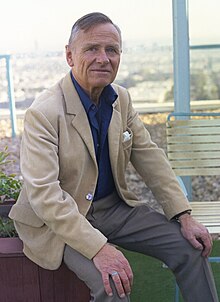Christopher Isherwood
| Christopher Isherwood | |
|---|---|
 |
|
| Born | Christopher William Bradshaw Isherwood 26 August 1904 Wyberslegh Hall, High Lane, Cheshire, UK |
| Died | 4 January 1986 (aged 81) Santa Monica, California, US |
| Occupation | Novelist |
| Language | English |
| Citizenship | British, American (naturalised) |
| Alma mater | Corpus Christi College, Cambridge |
| Partner | Heinz Neddermeyer (1932–37) Don Bachardy (1953–86) |
|
|
|
| Signature | |
Christopher William Bradshaw Isherwood (26 August 1904 – 4 January 1986) was an English-American novelist. His best-known works include The Berlin Stories (1935-39), two semi-autobiographical novellas inspired by Isherwood's time in Weimar Republic Germany that were adapted into the acclaimed film Cabaret (1972); and his 1964 novel A Single Man.
Isherwood was born in 1904 on his family's estate close to the Cheshire-Derbyshire border. He was the elder son of Frank Bradshaw Isherwood, a professional soldier who fought in the Boer War, by his wife Kathleen (née Machell Smith), whose family were successful merchants. Frank Isherwood was the son of John Henry Isherwood, head of the landed gentry family of Isherwood of Marple Hall and Wyberslegh Hall, Cheshire, and a descendant of the regicide John Bradshaw. The Isherwood family estates came into their possession on the marriage of Mary Bradshaw (of the family that had held them for centuries) to Nathaniel Isherwood, a felt-maker from Bolton, Lancashire, in the early 1700s.
At Repton School in Derbyshire, Isherwood met his lifelong friend Edward Upward with whom he wrote the extravagant "Mortmere" stories, of which one was published during his lifetime, a few others appeared after his death, and others he summarised in Lions and Shadows. He deliberately failed his tripos and left Corpus Christi College, Cambridge without a degree in 1925. For the next few years he lived with violinist André Mangeot, worked as secretary to Mangeot's string quartet and studied medicine. During this time he wrote a book of nonsense poems, People One Ought to Know, with illustrations by Mangeot's eleven-year-old son, Sylvain. It was not published until 1982.
In 1925 A.S.T. Fisher reintroduced him to W. H. Auden, and Isherwood became Auden's literary mentor and partner in an intermittent, casual liaison. Auden sent his poems to Isherwood for comment and approval. Through Auden, Isherwood met Stephen Spender, with whom he later spent much time in Germany. His first novel, All the Conspirators, appeared in 1928. It was an anti-heroic story, written in a pastiche of many modernist novelists, about a young man who is defeated by his mother. In 1928–29 Isherwood studied medicine at King's College London, but gave up his studies after six months to join Auden for a few weeks in Berlin.
...
Wikipedia
